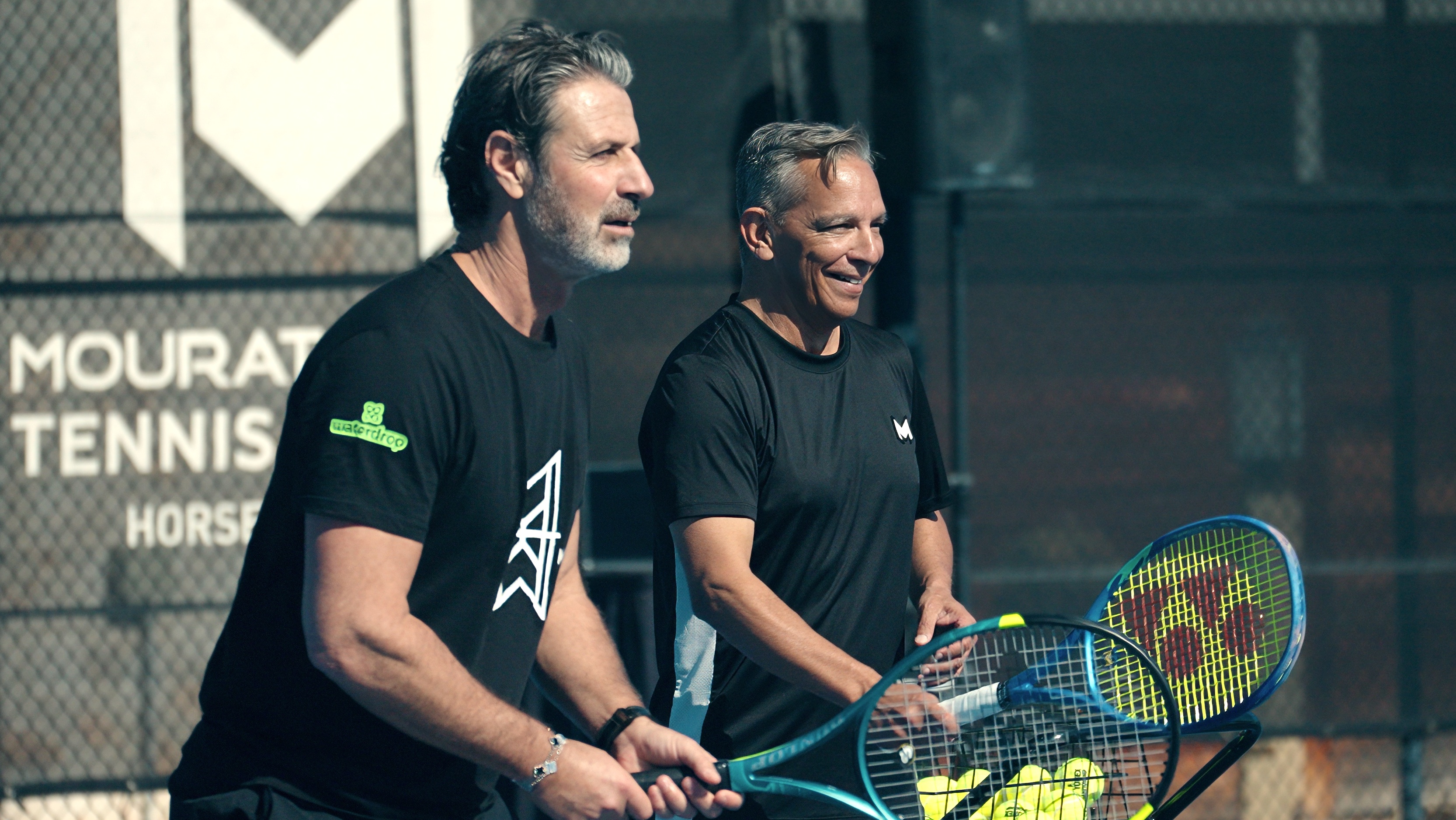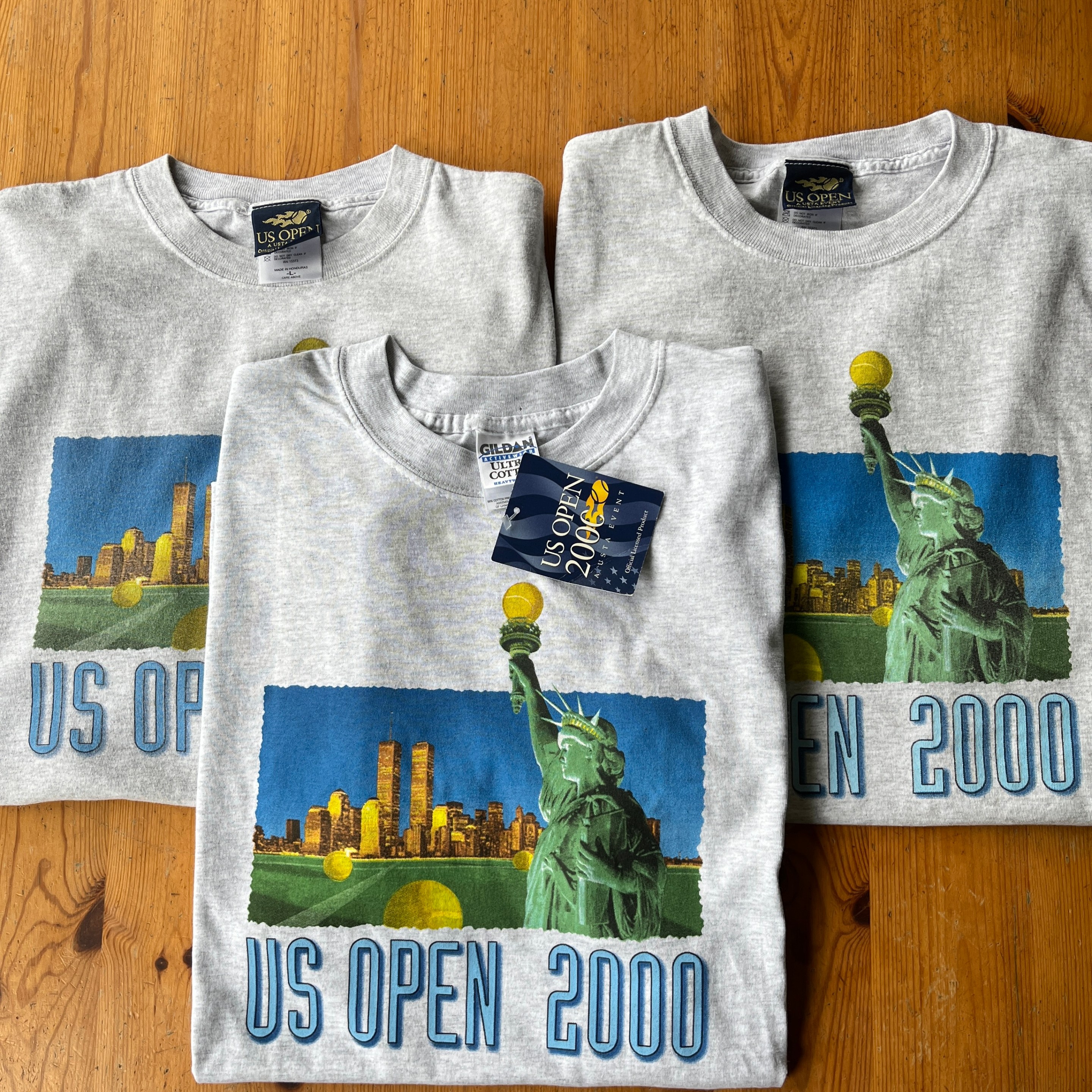It’s damned hot in London right now, at the beginning of Wimbledon 2025. After a spectator fainted from the heat during the five-set Alcaraz-Fognini match, we thought this prescient article from Issue 21 was in order. We at Racquet are firmly in camp shade.
“Let us not speak of them, but look, and pass.” —Dante Alighieri’s Inferno, but also anyone with shady seats as they walk past people in umbrella hats.
Hell is the middle of a row on the hot side
of an unsheltered tennis stadium.
The region of Hell I’m talking about is a new addition; Dante said nothing about it in his Inferno, and I feel like he would at least have mentioned it if Virgil had shown him around the grounds of the Atlanta Open in July. No, this torment came into being some time after the noble sport of lawn tennis migrated from England’s green and pleasant land to heat islands in the world’s largest cities amid a global temperature crisis.
Those who have endured this particular punishment will know the misery of sitting in a plastic seat in the blistering sun, rearranging the towel you draped over your head in an attempt to ward off the skin cancer for a little longer and hoping the crowd-cam never pans to you but it probably will because you look—and feel—like a lobster sphinx. You can’t escape until the changeover, and when you stand up, everyone around you will know just where your sweat has been pooling.
That’s if you’re one of the lucky ones who didn’t faint in the heat and stop play for 10 minutes and draw the camera to you—the one you’ve been avoiding because of the towel, see above—but of course the camera zooms in to get a good look at the red-faced chap on the ground who’s not sure how he got there but man it’s hot today in Rome and here comes actual Jannik Sinner with a couple of chilled bottles of water from his personal stash and the man’s a ministering ginger angel. And the reason you’ve had to undergo all this, Jannik Sinner notwithstanding, is that you wanted to save money or these were the only tickets left or you’re a murderer and you deserve it.
You’ll be in good company, of course, because the players aren’t excluded from this torture. During the second round at the 2018
Australian Open, the air temperature was 102, but according to some dumb rules, the roof doesn’t close until it hits 104, especially if it’s a “dry heat,” so Gael Monfils, a human specimen if ever there was one, was struggling to stay upright in a match against specimen-in-a-different-way Novak Djokovic on a156-degree court. 156. No one will be shocked to hear that Novak, who by some crazy fluke was allowed to just waltz into Australia that year, won in four sets.

Some he-men bellow from their mom’s basement that playing in the heat is part of the sport and that a professional should train for extreme conditions. But conditions are getting rapidly, alarmingly more extreme every year: In 2020, half of Australia was on fire and the smoke affected play at several tournaments, including the Australian Open. And according to the Intergovernmental Panel on Climate Change and everyone else with half a brain, average global temperatures will continue to rise until at least 2050, and very likely beyond. And anyway, define “extreme.” Snow is extreme, but nobody’s expected to play in it.
So that’s Hell. Heaven is anywhere, literally anywhere, on the shady side. It’s reserved for the lucky and the rich and those who did a little research before they bought their tickets. There’s a deep shade cast by the stadium itself, and all who sit in its cool embrace are happy they’ve lived the kind of life that led to this moment. It’s a full 20 degrees cooler over here, and there’s less UV radiation. These people will actually live longer.
Of course, there are those who choose seats in Hell and imagine they’ll make their own little slice of Heaven by smuggling in umbrellas, but it doesn’t work because the person with shins sitting behind them is unimpressed with the poky spokes, and anyway nobody wants to titter under a parasol like a Gilbert and Sullivan heroine for three hours.
No: Parasols and comically large hats are not the way out of this hellscape. The way forward is actually a hard left, then another hard left, then hightailing it straight back 2,000 years to when the Romans were in charge.
The Romans knew the value of a shady seat. When another gruesome spectacle was planned, the organizers pulled out all the stops and covered the Coliseum with velaria, or awnings. This process took days: hundreds of posts erected, ropes guyed, sailors summoned from the fleet in the Bay of Naples, sails deployed, and shade delivered to the masses. And this wasn’t a permanent installation; they had to dismantle it for rain or wind and then do it all again for the next bloodbath. Because, yes, the Romans staged ghastly fights to the death for sport, but they drew the line at sweltering in the stands. Plus, and I can’t stress this enough, fewer fainting spectators meant they could focus on the dismemberment at hand. Win-win, or rather, vincere-vincere.
The ghostly whispers from well-shaded
spectators of yore go mostly unheeded these
days as developers continue to build big,
glamorous, resolutely oven-like stadia on an
increasingly toasty planet, but there are a few planners with The Sight: Whoever built the Am Rothenbaum tennis center in Hamburg, Germany, home to the Hamburg Open,
definitely sees dead people. It’s innovative in
at least two ways, though knowing the Germans there are probably others: (1) The logo changes yearly, to reflect the ball’s trajectory on the previous year’s winning point (I sit in eager anticipation for the year it’s won on an ace); and (2) A shade covers most spectators permanently, with a central circle that can
deploy to cover the entire stadium. Clever
Germans. To them, and to the builders of the
shaded arenas in Adelaide and Sydney, both of which have “canopy roofs” with open sides for air circulation and general pleasantness that makes it possible to play outdoor tennis without the cancer: Thank you for showing us that we can have nice things.
And to those contrarians who insist they just love to sit in the sun and watch hours of tennis: Allow me to direct you to the outer courts at every tournament; you’ll pay less for the privilege of roasting yourselves and you’ll be so close to the players! Vincere-vincere.
Wendy Laird lives and writes in Seattle, which
is supposed to be a “climate refuge” but lately doesn’t feel like it.






